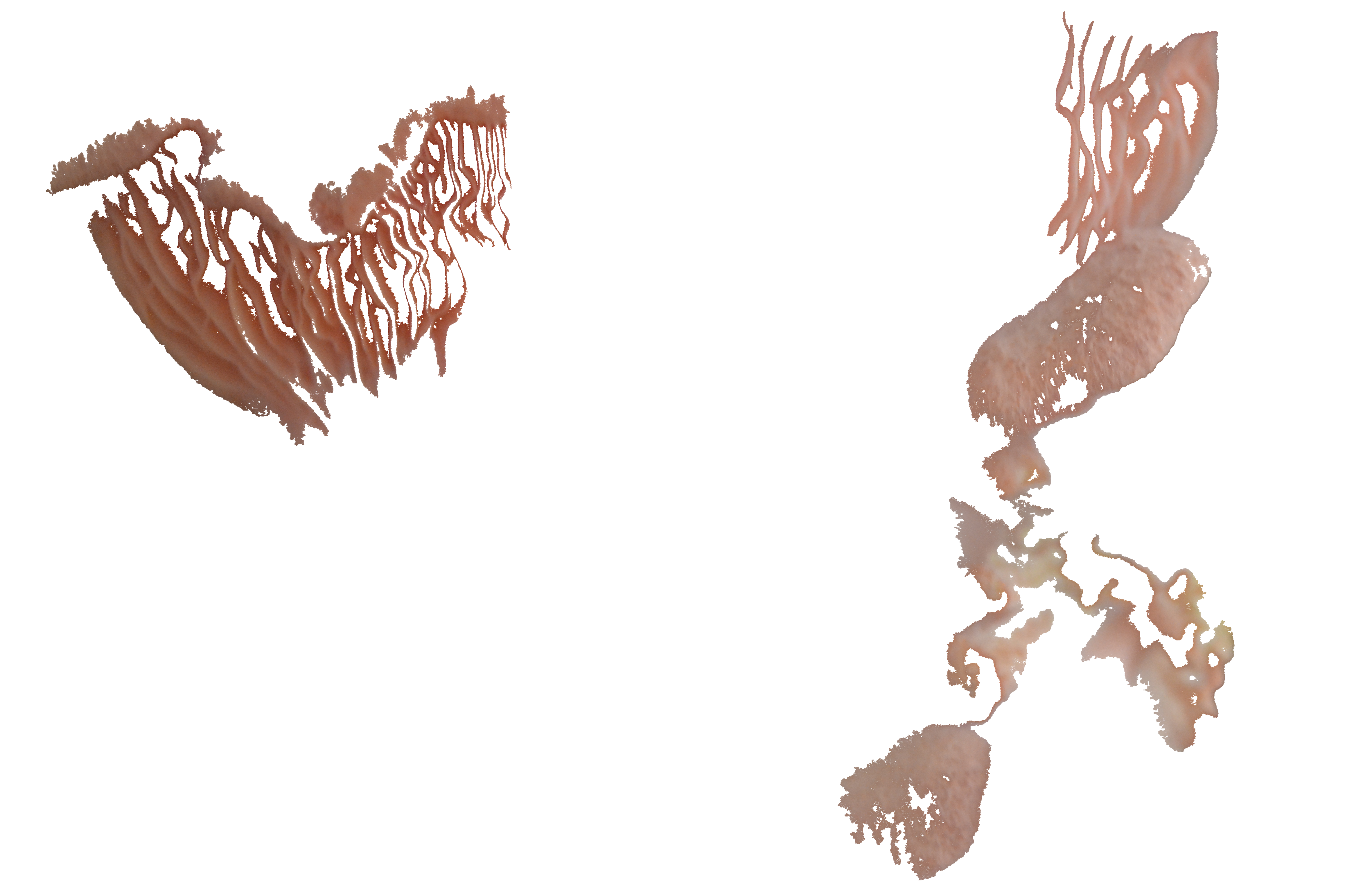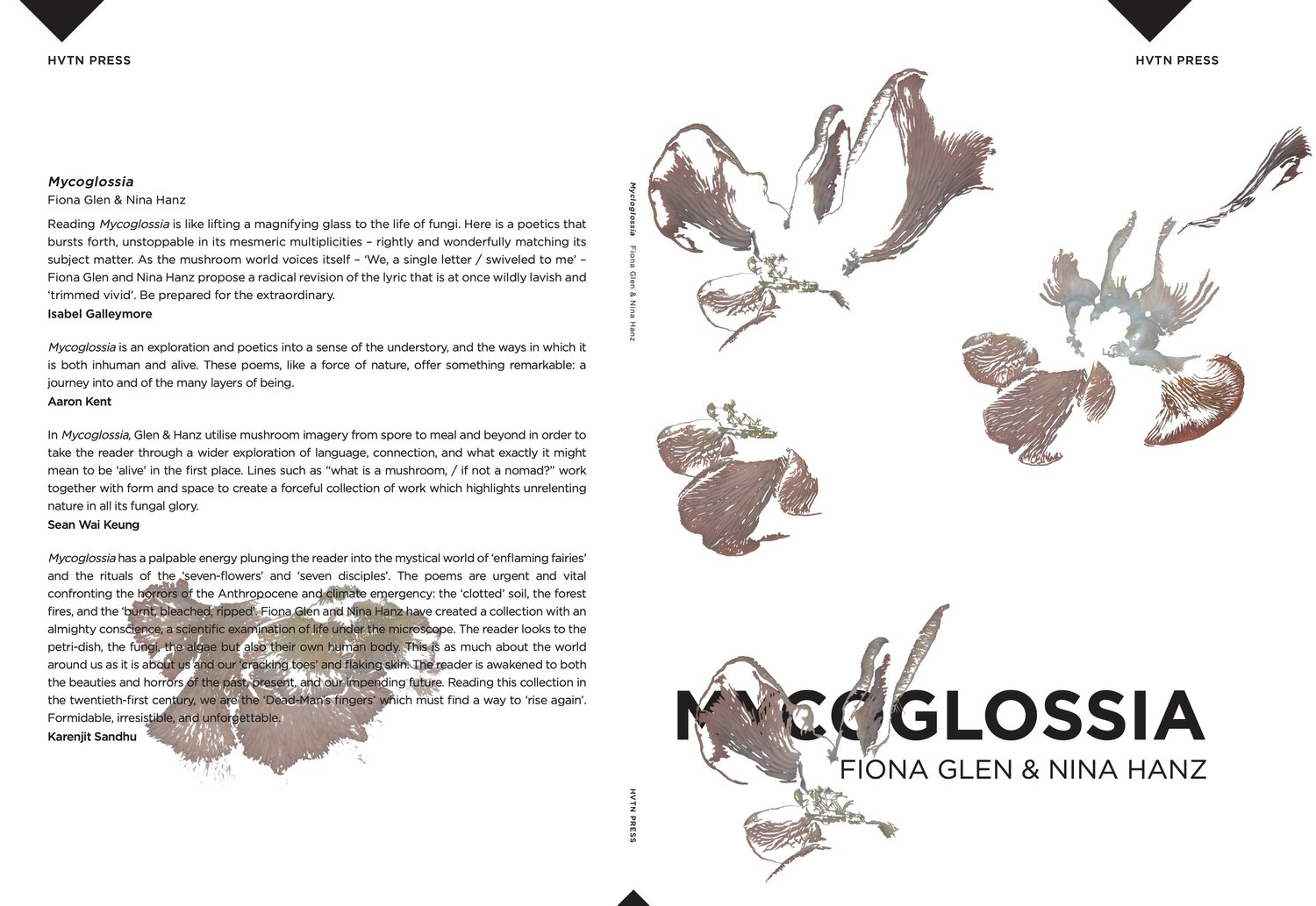
Mycoglossia
Poetry pamphlet written in deep collaboration with Nina Hanz, and published by HVTN Press in December 2022. Mycoglossia is an experimental collection of ‘mushroom tongues’ – an attempt to break conventions in poetic form – an enticement of non-human voices from the page.
This collection started with the contagious shared idea of making poems that ‘moved like spores’. It grew in a shared Google Doc during the early 2020 COVID-19 lockdown, found form as a 6-page magazine spread, and then blossomed into a 40-page pamphlet. You can buy it from our UK-based publisher, or from ChertLüdde Books in Germany, which offers international shipping. Its illustrations and cover art are by the talented Zsófia Jakab.
Mycoglossia has been read and featured at a range of events, from its launch in December 2022 at ChertLüdde Gallery, Berlin, to Mushroom Church. This nurturing evening of shared sound, words and connection to nature was convened on 1 March 2024 at Vancouver’s Christ Church Cathedral, by Modern Biology (Tarun Nayar), a maker of mushroom music.
The collaboration between Nina and myself is ongoing, and we have expanded on our ideas in various ways. In February 2023, we presented a lecture at the National Poetry Library, London, as part of a special evening on writing poetry with more-than-humans. In August 2023, we ran a collaborative experimental writing workshop called Sporing Poetry at Floating, Berlin, to share ecology-inspired techniques for exchange and co-writing with others. In September 2023, we published an experimental essay, ‘The Mesh, the Flesh, the Mushroom’, with MAP Magazine, bringing our process to life. You can also read about the collection in the context of writing with non-human voices in this article. We are open to collaborations with scientists, artists, publications, and more, so please reach out if you would like to share an idea.
‘in edges, everything’ from Mycoglossia:
you bubble up nightly
an anyone as many-one
your union of tight-knit weavers
advancing on parallel
trama-tracks: rootshape
of hope and hyphae
feeling out futures, you thrive
on time’s thick margin
cryptic and cosmopolitan
beetle-skinned in chitin
born with all your cells; mitotic,
they swell rather than splitting
inheriting everything, yours
are the wide-webbed worlds
undreamt by our anarchists:
earth-turning matrices, a source-share
subversive
a true underground
Endorsements:
Mycoglossia: Words that branch, connect, search, digest, swell, tunnel, rise, and reduce; words that sit uneasily at the edge of names; words that unexpectedly explode in generous fruiting bodies, littering the landscape with bounty. This is a collection to savour.
—Anna Lowenhaupt Tsing
Reading Mycoglossia is like lifting a magnifying glass to the life of fungi. Here is a poetics that bursts forth, unstoppable in its mesmeric multiplicities – rightly and wonderfully matching its subject matter. As the mushroom world voices itself – ‘We, a single letter / swiveled to me’ – Fiona Glen and Nina Hanz propose a radical revision of the lyric that is at once wildly lavish and ‘trimmed vivid’. Be prepared for the extraordinary.
— Isabel Galleymore
Mycoglossia is an exploration and poetics into a sense of the understory, and the ways in which it is both inhuman and alive. These poems, like a force of nature, offer something remarkable: a journey into and of the many layers of being.
— Aaron Kent
In Mycoglossia, Glen and Hanz utilise mushroom imagery from spore to meal and beyond in order to take the reader through a wider exploration of language, connection, and what exactly it might mean to be ‘alive’ in the first place. Lines such as “what is a mushroom, / if not a nomad?” work together with form and space to create a forceful collection of work which highlights unrelenting nature in all its fungal glory.
— Sean Wai Keung
Mycoglossia has a palpable energy plunging the reader into the mystical world of ‘enflaming fairies’ and the rituals of the ‘seven-flowers’ and ‘seven disciples’. The poems are urgent and vital confronting the horrors of the Anthropocene and climate emergency: the ‘clotted’ soil, the forest fires, and the ‘burnt, bleached, ripped’. Fiona Glen and Nina Hanz have created a collection with an almighty conscience, a scientific examination of life under the microscope. The reader looks to the petri-dish, the fungi, the algae but also their own human body. This is as much about the world around us as it is about us and our ‘cracking toes’ and flaking skin. The reader is awakened to both the beauties and horrors of the past, present, and our impending future. Reading this collection in the twentieth-first century, we are the ‘Dead-Man’s fingers’ which must find a way to ‘rise again’. Formidable, irresistible, and unforgettable.
— Karenjit Sandhu
